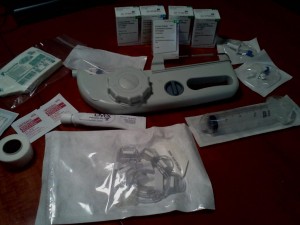by April | Jul 15, 2015 | Encouragement, sacrifice, Trust
Have you heard of the books titled All I Ever Needed to Know I Learned in Kindergarten? Or learned from my dog, or from the Wizard of Oz, or from Star Trek (that’s my personal favorite). They list all the positive and negative things the author learned about life from those experiences. But I have a new take.
This past year, I’ve taken stock of a lot of things in my life, and I can honestly say I’m more whole now in this broken body than I was before I got much more seriously sick. Illness affected my life from birth. Little did my family or doctors know, but my body had a genetic break that kept me from making antibodies to colds or infections that, over time, got worse and worse.

April McGowan 1973
This is me in the hospital, age 3. Raggedy Ann is peeking over my shoulder (I still have her) and that bear seems to be doing an excellent job of standing guard!
Here’s what no one tells you. Chronic illness doesn’t just change a few things in your life, it changes everything. Part of those changes extend to the very definition of what quality of life, happiness and joy mean–and their effects on every aspect of our lives. And although I’m riding on a hard road I wouldn’t wish on anyone at all, I’m thankful for it. I never thought I’d say that.
For the next several weeks, I’m going to be sharing about how everything I needed to know to live well, I learned from being chronically ill. I’ll make a helpful tab on my blog to chronicle them all in case you miss any. Here are some of the highlights I’ll be covering (the order may change as I go along):
- What marriage means
- What parenting means
- What suffering means
- What friendship means
- What loss of friendship means
- What living in the moment means
- What submission means
- What support groups mean
- What life goals mean
- What work means
- What helping others means
- What plans mean
- What hope means
- What dreams mean
- What acceptance means
- What boundaries mean
- What grief means
- What being tired means
- What giving up means
- What hanging on means
- What honesty means
- What commitment means
- What sacrifice means
- What trusting God means
I’ve learned a lot in the past 45 years from chronic illness. Especially in the past five years. Lots of hard things. Lots of good things. But those hard things, when I let them, helped shape me into a different form—into a person I like a whole lot more, and into a faith deeper and more intimate with Jesus than I could have ever imagined. I venture to say that any challenging experience you have can do that, if you let it.
So I hope you’ll join me as I blog, and take part in conversations along the way, sharing your heart with me, too.
Until next time,
April
by April | Jan 27, 2015 | Chronic Illness, commitment, Marriage, sacrifice, Surviving Chronic Illness, Trials, Trust
 If you’re like me, the American dream was drilled into your head through television. That dream is slightly askew these days, but I think it’s still holding fast in our psyches. It goes something like this: I’m going to marry the person of my dreams. We’re going to live happily ever after (whatever happily means by your definition). We will be married forever and die at a ripe old age, painlessly, holding hands in our sleep. Marriage is all about love and romance and passion and having my needs met. Right?
If you’re like me, the American dream was drilled into your head through television. That dream is slightly askew these days, but I think it’s still holding fast in our psyches. It goes something like this: I’m going to marry the person of my dreams. We’re going to live happily ever after (whatever happily means by your definition). We will be married forever and die at a ripe old age, painlessly, holding hands in our sleep. Marriage is all about love and romance and passion and having my needs met. Right?
It doesn’t include driving your spouse to the hospital at 2 AM because he can’t breathe, and then sleeping in the hospital parking lot in the car with your baby because you can’t trust yourself to drive home. It doesn’t include holding your spouse’s head while he or she vomits, or wiping up the floor because they’ve missed the toilet. It doesn’t include watching your spouse fade from the person they were because of chronic illness a good forty years ahead of schedule due to a genetic disease. It doesn’t include going into debt to pay for medications and specialists. Or watching them spend thirty plus hours of each week curled in a chair because their life-saving medication makes them feel awful. Or surgery. Or accidents. Or any of those uncomfortable things that reminds us this life can be one trial after another.
But it should. I feel like petitioning every premarital counselor out there and asking them to change their quizzes. What will you do if you can’t take that trip you’ve always wanted to take? What will you do when your spouse becomes disabled (we all seem to at one point or another), or if your spouse gets cancer and loses a body part or goes bald? If they lose their minds to disease? What will you do if your loved one is suffering? When you need to bathe them or change them? Will you leave because you can’t bear to watch them suffer? Or because your needs aren’t being met and they’ve become a burden (whatever burden means by your definition)? I sure hope not.
This blog post honors those who stay.
The world says self, but God’s Word says sacrifice. God created marriage as a sacrificial covenant. It’s not just a safe place to have kids. It’s not just an expensive party where your friends and family come wish you well and and give you awesome presents (we got 12 clocks…is there a hidden meaning in that?). Or about tax write-offs (and thanks to the government, that’s about to end anyway!). Contrary to popular belief, it’s about loving that other person sacrificially. It’s about putting them and their needs before yours. It’s not about you, it’s about them.
So. If you have stayed when it was messy, painful, heartbreaking, perspective shifting, expensive, inconvenient, dream-killing, hard, sleepless, tiresome: thank you. You mean the world to your spouse who feels like a burden, who wishes they were different or circumstances were different. You are showing them and the world what it means to die to self. You are reflecting the sacrificial love of God to your spouse, your kids, your friends–even strangers. And in that, the sacrifice Jesus made for us all.
Thanks for staying.
by April | Apr 17, 2013 | Chronic Illness, CVID, Encouragement
 Last night my son came in the living room and said, “I love Tuesdays because we get to watch something fun and we always have popcorn.” He looked so happy. And that really struck me, because up until about five months ago, Tuesdays were not fun. Tuesdays are the day I do my infusion treatment for my CVID.
Last night my son came in the living room and said, “I love Tuesdays because we get to watch something fun and we always have popcorn.” He looked so happy. And that really struck me, because up until about five months ago, Tuesdays were not fun. Tuesdays are the day I do my infusion treatment for my CVID.
I’ve blogged a couple times on how my attitudes have changed since I started treatment for my CVID. I wrote in a previous post how I started thinking of my IgG infusion as immunobuddies rather than an enemy making me feel fatigued, achy and stealing my night and part of the next day away. I also stopped looking at Tuesdays like I wanted to skip them altogether. Instead, I started to think about how I could make this routine into something a bit more enjoyable.
I used to just try and keep my stress low on Tuesday, and make an easy meal before I started my treatment (I won’t share with you the perils of trying to cook whilst carrying around a pump—let’s just say getting your lines caught on a cutting board makes you want to plan ahead!).
But now, not only do I get dinner all prepped and finished before I start my infusion, but I also make popcorn. Popcorn??? Yep. Because I’ve turned Tuesday into ‘low stress, let’s have fun’ night. We’ll turn on a show I love or put in a movie we’ve been waiting to see.
My kids used to say, “Oh, it’s your treatment night,” in an empathetic sad voice. Now, all of us have something to look forward to. My two hours pass and we’ve had a nice evening together. I’m still curled in a ball in the chair after my infusion is over, but at least I’m in pretty good emotional condition now.
And I get popcorn.
What sorts of things do you do help you cope with a rough time? I’d love hearing about it.
May our Lord bless and keep you.
***Novel release update: June is around the corner, and Jasmine will release digitally on the 15th. I’m finishing final edits as you read this, my book trailer is just about ready, and I’m going to have friends popping over here now and then to share about their books. See you next week.***
by April | Nov 7, 2012 | Chronic Illness, CVID, Encouragement, Faith, PIDD, Prayer
 The other day, sick again (seriously!) I was at the doctor’s office seeing a fill-in because I couldn’t get into see my regular physician. As often happens, she didn’t have a clue what CVID was—and she wasn’t really up on primary immunodeficiency. And when I said IgG replacement a tiny light went on—but still, not getting it. (I make time to mention that she’s seen me twice before and hadn’t a clue).
The other day, sick again (seriously!) I was at the doctor’s office seeing a fill-in because I couldn’t get into see my regular physician. As often happens, she didn’t have a clue what CVID was—and she wasn’t really up on primary immunodeficiency. And when I said IgG replacement a tiny light went on—but still, not getting it. (I make time to mention that she’s seen me twice before and hadn’t a clue).
If you don’t know about CVID, then here’s a window: I went from a sore throat at 2:30 to full on bronchitis by 4:00. Colds hit fast, and hard! Considering I had pneumonia in September…well, you get the idea. It really wears down a person.
Anyway, I’m not blogging to come down on a doctor or whine about colds (tempting…but no). I’m sharing a change in attitude.
When I first started weekly subcutaneous IgG replacement therapy, I was hopeful, but scared (it’s a blood product after all, and stuff can go wrong). It involves pumps and syringes and needles—but I was so glad to have help, I did it. Then, at about 10 weeks, I started to have panic attacks—heart racing, sweat-breaking, hand shaing attacks (you get the idea). It got harder and harder to insert the four needle lines and sit there for 2 1/2 hours infusing, afraid to move. After much prayer, and changing some pre-meds, things got easier, and by 25 weeks I realized I needed to start thinking differently about IgG, or the stress would do me in. I started to picture the 90mls of fluid as friends (this came from some very early advice via a friend who’d overcome cancer a couple years ago). I came up with a positive sounding name for my treatment. Oh, and I prayed. A lot.
Guess what? It worked. So super well, that I’ve incorporated it into my thinking, and was brought up short at the doctor’s office, not realizing I’d used the term. When I got done explaining my rare condition, the doctor stared at me blankly. She asked, “What are these ‘immuno-buddies’ you keep referring to?”
I stared back at her and clicked through our conversation in my head. Yep. Instead of saying I was taking immunoglobulin replacement therapy, I’d said, “I guess my immuno-buddies haven’t had this bug yet.”
I went on to explain my thinking and what the term meant to me. She still looked a bit blank, but I wasn’t thinking about that. I was thinking about the turning point in my therapy/care of this disease. It felt like pure victory to me.
I’m not going to say it’s fun, or a breeze now, because it’s not—but I know this is helping me, strengthening me, and God’s answer for keeping me safe for now. Maybe one day they’ll come up with a daily infusion, like they have for diabetes (that’d be so very cool). But, for now, I have my weekly immuno-buddies.
Facing these kinds of challenges can either tax our strength and tear us down, or make us stronger depending on our attitude about it. I’m not saying it’s a quick fix or instant change, but with daily prayer and submission to the Father, we can be more than conquerors in this life.
Romans 8:31, 37-39 What, then, shall we say in response to these things? If God is for us, who can be against us? …No, in all these things we are more than conquerors through him who loved us. For I am convinced that neither death nor life, neither angels nor demons, neither the present nor the future, nor any powers, neither height nor depth, nor anything else in all creation, will be able to separate us from the love of God that is in Christ Jesus our Lord. (full text here)
by April | Sep 5, 2012 | Chronic Illness, CVID, Encouragement, Faith, homeschooling
 Comparisons happen in our minds all day long. How much more caffeine is in that 24 oz latte than the 16 oz? Is that spider bigger than the one I saw yesterday, or is that one of its many babies? If I use that super extensive homeschool curricula, will I churn out a gifted student poised to take on the world? (Can you tell we’re getting ready for our first year of homeschooling through high school?).
Comparisons happen in our minds all day long. How much more caffeine is in that 24 oz latte than the 16 oz? Is that spider bigger than the one I saw yesterday, or is that one of its many babies? If I use that super extensive homeschool curricula, will I churn out a gifted student poised to take on the world? (Can you tell we’re getting ready for our first year of homeschooling through high school?).
Comparisons are natural—it’s something our brain does without thinking about it. And that’s where the danger lies. Our eyes. I might see a house that is larger than my own and think about all that extra space I could use and become discontent. Or, see that super in-shape person on TV and be tempted to feel badly about my body. In our subconscious state, comparisons can turn to coveting before we can blink.
When I first entered this flare-up of CVID last year, I had well meaning people say, “It could always be worse.” Or, “You could be as sick as this other person, be grateful you’re not them.” I realized right then, that’s not a good scenario. Because in comparing myself to others, ill or well, rich or poor, gifted or normal, I’m going to be tempted to do one of two things: I’ll either gloat and feel self-righteous, or I’ll wallow and start to feel sorry for myself. Both are sinful.
It’s not an easy thing to do, to walk through this life and keep my eyes on God’s plan and off of what is happening in other people’s lives—to be objective. But, it’s something worth striving for. God’s got a different road for everyone to travel. It does Him a disservice if I’m always wishing I was someone else.
If you’ve been walking (reading) alongside me this past 18 months, you’ll know I’ve been awfully sick. The good news this week is that I’ve been administering immunoglobulin replacement therapy for 6 months now, and I’m about 60% better than I was last year at this time. That is HUGE. I’m so grateful to God for treatment for my illness.
If you’re suffering and are waiting for healing, please know that God hears your prayers—and He’s got a plan for you. It might involve miraculous healing. It might involve being healed through modern medicine (for which I’m very grateful, because I’d be long dead from any number of things by now). But, whatever happens, whatever the path, He’s on it with you. He promises that to His children. Keep your eyes on Him.
Deuteronomy 31:6 Be strong and courageous. Do not be afraid or terrified because of them, for the Lord your God goes with you; he will never leave you nor forsake you.”
Hebrews 13:5 Keep your lives free from the love of money and be content with what you have, because God has said, “Never will I leave you; never will I forsake you.” So we say with confidence, “The Lord is my helper; I will not be afraid. What can mere mortals do to me?”
Would you do me a favor? If you like what I’ve written, please share it with someone else 🙂 And I’d love to hear your comments and thoughts!





